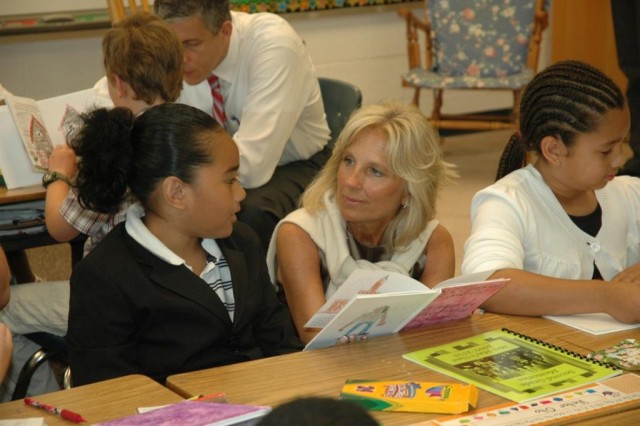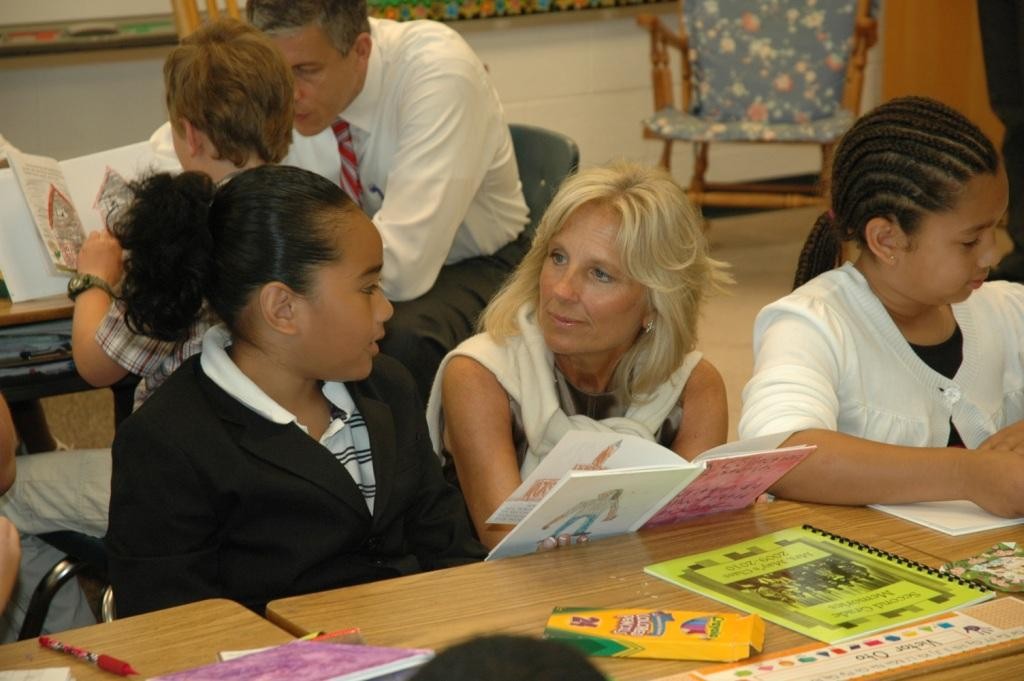
FORT BELVOIR, Va. - U.S. Secretary of Education Arne Duncan; William Lynn, deputy secretary of defense; and Jill Biden, wife of Vice President Joe Biden and a professor at a D.C. area community college, visited Fort Belvoir Elementary School Tuesday to participate in a roundtable with military parents and personnel.
Military parents and families had a chance during the roundtable to voice academic concerns and ask questions about a variety of educational programs available to school-aged children.
Participants asked questions ranging from school transfer difficulties to the need for improved teacher training within the DoD and in public schools.
A major topic of discussion during the roundtable was the students who have parents deploying and the effect such an event can have on a child academically.
Kathryn Griffin, whose husband is in the Virginia National Guard, expressed concern for Guard children, whom she worries get lost in public schools, where teachers may not get the special training they need to detect when children are experiencing problems due to a deployment or other military challenge.
Madeline Lanza, an Army spouse, echoed Griffin's concerns, pointing out that many teachers lack the experience and training to recognize military-related problems in students. Her husband deployed last May, she explained, and her child went through some "rough spots." While the teacher was helpful, she didn't have the experience to deal with the problems. She encouraged teachers to avail themselves of training.
Lynn addressed training in an interview after the roundtable. "The general issue is to get both training to the teachers who are dealing with the kids in the classrooms ... and the kind of counselor support so the teacher doesn't spend all their time with just a couple of students who are having challenges," he said. "Partly, that's training, and partly that's resources."
Renae Robinson, a Navy spouse, urged leaders to consider making it mandatory for servicemembers to notify the school of an impending deployment. That way, school officials will be able to look for signs of trouble and offer much-needed resources to students. Also, deployment classes and counseling should be made part of the curriculum in school, rather than offered as an option, she added.
Robinson also pointed out the difficulties of transferring between schools in different states. The Interstate Compact on Educational Opportunity for Military Children has eased some of these difficulties, she acknowledged, but not enough people know about the compact or how it can help them. The compact is a cooperative effort among states to address some of the administrative challenges military children run into when moving to a new school.
Lynn voiced his concern that the military faces two unique challenges in regards to education: frequent moves and multiple deployments.
Lynn said that, with every move, families must solve issues ranging from ensuring their children are adjusting to their new environment to moving records swiftly and correctly from each school they attend.
Lynn added that some military families face multiple deployments, with both parents gone for six months to a year.
"That sets up a particular challenge for our schools, for military families," he said. "How do we support those kids when one or both parents are deployed'"
Biden, also a mother of an Army National Guard officer, told the families she and First Lady Michelle Obama have been working to emphasize the difficulties military families are facing daily.
"I know how challenging life can be for you," she said. "We're here to listen to you."
Duncan felt the discussion on deploying parents provided a stepping stone to identifying and solving such an issue.
"I think we really have to think about how we are supporting families where parents are deploying. We know the mobility challenges and we understand that, but we need to make sure the teachers, counselors and social workers understand the tremendous challenges when a mother or father is gone," Duncan said. "I was talking to one child in the classroom today whose parent is deployed and just thinking what her mother and siblings are going through every day is mindboggling.
"We have to make sure we are doing everything we can to support these children and their families and make sure they are able to be comfortable, confident and they're getting that emotional help that's allowing them to be successful academically," Duncan said. "This school does an exemplary job of hitting that mark and, around the country, we can get much better at that."
Other top military and government officials present included Virginia Congressman Jim Moran; U.S. Army Chief of Staff Gen. George Casey and his wife, Sheila; Lynn Simpson, principal deputy undersecretary of defense for personnel and readiness; Belvoir Installation Commander Col. Jerry Blixt, and his wife, Deborah; Jack Dale, Fairfax County Public Schools superintendent; and Daniel Storck, Fairfax County School Board member.
The distinguished visitors began the event by meeting and observing students in Mrs. May's second-grade class. With the end of the school year nearing, the class was writing journals about their favorite memories from second grade.
Duncan, Biden, Moran and the Caseys spent one-on-one time with the children learning about their summer plans and the children's experiences with life in the military.
Fort Belvoir Installation Commander Col. Jerry Blixt said of the visit, "We are honored that everyone took the time to visit Fort Belvoir and are grateful for their shared concern for the education of military children. We also appreciate Jane Wilson, her staff at the school and Fairfax County Public Schools."
Duncan felt the outcome of the roundtable was very beneficial for not just military schools, but schools throughout the nation.
"This was a huge chance for me to listen, learn and think about what is working here and what lessons we can take around the country and what are some of the challenges here as well," Duncan said. "I was very pleased and I really appreciate the great conversation today."
Editor's note: Elaine Wilson of the American Forces Press Service contributed to this story.

Social Sharing